|
|
|
Sort Order |
|
|
|
Items / Page
|
|
|
|
|
|
|
| Srl | Item |
| 1 |
ID:
137029


|
|
|
|
|
| Summary/Abstract |
Many authoritarian regimes selectively provide critical segments of the population with privileged access to goods and services, expecting political support in return. This article is interested in the effects of this regime strategy: Is violent opposition less likely to occur in subnational regions bound to the ruling elite through such patron–client networks? For its empirical analysis, the article makes use of crowdsourcing data on the number and geospatial distribution of fatalities in the Syrian civil war from March 2011 to November 2012. In terms of selective goods provision, the focus is on the electricity sector. Satellite images of the earth at night are used to proxy spatial variations in the public distribution of electricity in times of power shortages. These data are complemented with information from the last Syrian population census of 2004. Estimations from fixed effect logit models lend support to the hypothesis that the risk of violence has been lower in subdistricts that have been favored by the ruling regime in terms of preferential access to material goods. This hypothesis is further corroborated with qualitative evidence from Syrian localities.
|
|
|
|
|
|
|
|
|
|
|
|
|
|
|
|
| 2 |
ID:
178652
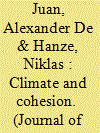

|
|
|
|
|
| Summary/Abstract |
While a large body of research has highlighted the conflict-inducing effects of climate change, we still know very little about the mechanisms linking environmental conditions to violent conflict. This article investigates the plausibility of a prominent channel according to which scarcity of natural resources can foster violent conflict through deteriorating intergroup relations. In addition to assessing the direct effects of adverse environmental conditions on intra-ethnic and inter-ethnic trust, we suggest a conditional argument on the role of horizontal inequality of hazard exposure. Environmental hazards are ‘unequal’ if they systematically affect ethnic groups differently. While inequality may reinforce intra-ethnic ties and out-group suspicion, equal hazard exposure may create a sense of unity among diverse victims in their collective struggle to cope with harsh environmental conditions. We test these arguments in the context of the severe drought periods that affected most East African countries in the years 2004 and 2005. The empirical analysis combines gridded information on drought severity with geo-located survey data across six countries in the region (Afrobarometer survey 2005/2006). Our main analyses find that exposure to drought hazards correlates positively with self-reported trust within and across ethnic groups. The latter association, however, depends on the degree of intergroup equality of hazard exposure and wanes as inequality increases. Taken together, these findings indicate that if droughts increase the risk of violent conflict, they seem to do so through mechanisms other than intergroup polarization and despite their positive association with ethnic trust. This is most likely the case in contexts where there is pronounced horizontal inequality of drought hazards.
|
|
|
|
|
|
|
|
|
|
|
|
|
|
|
|
| 3 |
ID:
119721
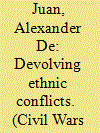

|
|
|
|
|
| Publication |
2013.
|
| Summary/Abstract |
Institutions can contribute to regulating interethnic conflict; however, in many cases, they fail to bring about lasting peace. The article argues that the negligence of subgroup identities accounts for some of this failure. Ethnic groups are often treated as unitary actors even though most consist of various linguistic, tribal, or religious subgroups. When interethnic conflict is settled, subgroup differences may come back to the fore. This 'resurgence' can lead to subgroup conflict about the political and economic resources provided through intergroup institutional settlements. This can in turn undermine the peace-making effect of intergroup arrangements. Different subgroup identity constellations make such destructive effects more or less likely. The article focuses on self-government provisions in the aftermath of violent interethnic conflict and argues that lasting intergroup arrangements are especially challenging when they involve 'contested' ethnic groups.
|
|
|
|
|
|
|
|
|
|
|
|
|
|
|
|
| 4 |
ID:
144453


|
|
|
|
|
| Summary/Abstract |
How do religious civil wars evolve? Many violent conflicts are fought between groups of different faiths. The paper argues, however, that religious differences rarely directly lead to conflict onset. Rather, the apparent religious dimension of many civil wars is a consequence of successful religious framing. Political and military leaders offer religious interpretations designed to legitimize the use of force and to mobilize believers to violent action. Such framing processes can be more or less successful, depending inter alia on the authority of the political and religious leadership, on the coherence and appropriateness of the frames, on the existence of persuasive counter-frames, and on the availability of communication infrastructures that allow for effective dissemination of religious frames. Comparing violent conflicts in the Philippines and Thailand, the paper shows that religious mobilization can fail along the theoretically predicted lines.
|
|
|
|
|
|
|
|
|
|
|
|
|
|
|
|
| 5 |
ID:
171845
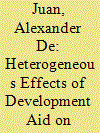

|
|
|
|
|
| Summary/Abstract |
Many countries experience massive aid surges when civil wars end. However, operational contexts tend to remain particularly sensitive due to a combination of persisting local-level cleavages and low-quality state institutions. Consequently, aid provision risks inciting distributional conflicts and violent unrest—most notably when resources are injected into areas of high social heterogeneity or particularly weak state administration. I investigate this argument in the case of postwar Nepal. I combine geo-coded aid data with village-level information on various forms of violent unrest, as well as on social demographics and institutional quality. The panel analyses indicate positive short-term effects of aid on social unrest. More fine-grained estimations reveal that this effect is driven by a short-term escalation of violence against nonstate actors—in particular in ethnically fractionalized villages under the administration of weakly performing local-level state institutions. Descriptive cross-country analyses indicate that aid may have similar violence-inducing effects in other postwar contexts.
|
|
|
|
|
|
|
|
|
|
|
|
|
|
|
|
| 6 |
ID:
085000
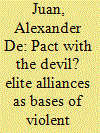

|
|
|
|
|
| Publication |
2008.
|
| Summary/Abstract |
This article aims at explaining religious conflicts on the basis of an elite-centered theoretical model. Violent movements can only pertain on the long run if political elites organize and coordinate them centrally. The same holds true for the religious dimension of many conflicts. Religious elites have to persuade the believers of the religious nature of their struggle. Hence, in many cases religious conflicts can be traced back to alliances of religious and political elites. The first try to protect their religious communities and hope to expand their religious influence. The latter try to use religion as a resource for mobilization
|
|
|
|
|
|
|
|
|
|
|
|
|
|
|
|
| 7 |
ID:
181196
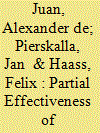

|
|
|
|
|
| Summary/Abstract |
Dictators depend on a committed bureaucracy to implement their policy preferences. But how do they induce loyalty and effort within their civil service? The authors study indoctrination through forced military service as a cost-effective strategy for achieving this goal. Conscription allows the regime to expose recruits, including future civil servants, to intense “political training” in a controlled environment, which should improve system engagement. To test this hypothesis, the authors analyze archival data on over 370,000 cadres from the former German Democratic Republic. Exploiting the introduction of mandatory service in the GDR in 1962 for causal identification, they find a positive effect of conscription on bureaucrats’ system engagement. Additional analyses indicate that this effect likely did not result from deep norm internalization. Findings are more compatible with the idea that political training familiarized recruits with elite preferences, allowing them to behave strategically in accordance with the rules of the game.
|
|
|
|
|
|
|
|
|
|
|
|
|
|
|
|
| 8 |
ID:
140872


|
|
|
|
|
| Summary/Abstract |
Many civil wars are fought between members of different religious communities. It seems plausible to focus on these communities’ interrelations to identify the causal factors responsible for the escalating effects that religion can have in such conflicts. A closer look, however, reveals that processes within religious communities can be crucial in influencing the role religions play in intrastate wars. Within single communities, factions of religious elites compete for material and dogmatic supremacy. Such intra-religious conflicts can motivate religious elites to search for support from political allies to prevail over their religious rivals. In return, they legitimize their political patrons’ claims for political power and their violent campaigns against members of other religious communities. Thus, intra-religious conflicts can effectively contribute to the religious escalation of intrastate wars between different religious communities. This argument is exemplified with reference to conflicts in Thailand, The Philippines, and Iraq.
|
|
|
|
|
|
|
|
|
|
|
|
|
|
|
|
| 9 |
ID:
163432
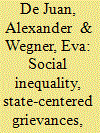

|
|
|
|
|
| Summary/Abstract |
What role does horizontal social inequality play for political protest in middle-income countries? We argue that public social service provision is an important driver of state perceptions. When a state fails to deliver services in an equitable manner, trust in institutions erodes and protest becomes more likely. We use a mixed methods design to investigate this argument in South Africa. First, we combine police event records with census data to estimate correlations between service inequality and protests. Second, we draw on an opinion survey with 27,000 respondents to investigate the suggested mechanism linking social inequality to protest through political attitudes. Third, we focus on qualitative protest accounts in two areas identified by a matching approach to assess the plausibility of our quantitative findings. Throughout these analyses, we document a robust association between horizontal social inequality and protest.
|
|
|
|
|
|
|
|
|
|
|
|
|
|
|
|
| 10 |
ID:
180189
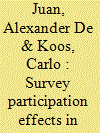

|
|
|
|
|
| Summary/Abstract |
Do survey participants in conflict zones respond differently if they have been interviewed before? Academic and policy interest in postwar political opinion has increased tremendously. One unexpected consequence of this surge of survey research is a growing probability that individuals will be interviewed multiple times. However, if participating in one survey causes respondents to change their attitudes or behavior, their subsequent survey responses may be biased in comparison to the rest of the sample population. Our article aims to investigate such ‘survey participation effects’ in conflict contexts. We draw on original survey data collected in the eastern Democratic Republic of Congo (DRC). In our representative sample, 18% of respondents report that they have been interviewed before. Multivariate analyses demonstrate that their stated attitudes on social relations, political institutions, gender norms, and wartime victimization differ substantively from the responses of first-time interviewees. Moreover, our analyses indicate that experienced respondents have specific response styles – in particular, a tendency to support extreme response options. While substantive bias in multivariate analyses seems to be rather rare, our findings indicate that researchers should be aware of the footprints of data collection efforts in areas frequently targeted by household and opinion surveys.
|
|
|
|
|
|
|
|
|
|
|
|
|
|
|
|
| 11 |
ID:
173887


|
|
|
|
|
| Summary/Abstract |
A large body of research indicates that environmental conditions can influence the risk of social unrest. However, we know little about how these effects may change in the long run. Are they likely to remain constant or do they change over time – for example as a consequence of human adaptation? To investigate this question, we rely on a disaggregated analysis of England over a period of more than 300 years. Combining data on geo-referenced food riots with reconstructed climate data, we first assess the impact of annual temperatures on social unrest over the period 1500–1817. We then use our long-term time-series dataset to assess the temporal heterogeneity of year-to-year associations between temperatures and social conflict. Our models show a substantive negative correlation between temperatures and food riots in the aggregate. This association, however, seems to be highly inconsistent over time and largely confined to the 18th century. In addition, we find evidence of decadal processes of adaptation: past exposure to adverse weather conditions dampens the effect of current exposure. Taken together, these findings underline the importance of considering temporal heterogeneities when assessing the climate–conflict nexus and caution against any simple extrapolations of observable present-day effects of environmental conditions into the future.
|
|
|
|
|
|
|
|
|
|
|
|
|
|
|
|
| 12 |
ID:
193693


|
|
|
|
|
| Summary/Abstract |
Can wars breed nationalism? We argue that civilians’ indirect exposure to war fatalities can trigger psychological processes that increase identification with their nation and ultimately strengthen support for nationalist parties. We test this argument in the context of the rise of the Nazi Party after World War 1 (WW1). To measure localized war exposure, we machine-coded information on 7.5 million German soldiers who were wounded or died in WW1. Our empirical strategy leverages battlefield dynamics that cause plausibly exogenous variation in the county-level casualty fatality rate—the share of dead soldiers among all casualties. We find that throughout the interwar period, electoral support for right-wing nationalist parties, including the Nazi Party, was 2.6 percentage points higher in counties with above-median casualty fatality rates. Consistent with our proposed mechanism, we find that this effect was driven by civilians rather than veterans and areas with a preexisting tradition of collective war commemoration.
|
|
|
|
|
|
|
|
|
|
|
|
|
|
|
|
|
|
|
|
|